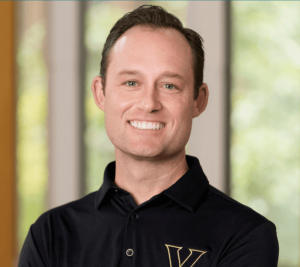By Arial Struthers
When considering pursuing an Executive MBA (EMBA), you may be wondering about the role your undergraduate degree will play in your being accepted into a program. You are not alone in your questions, in fact, many prospective EMBA students share your same concerns, especially those who have been out of school for years and earned an undergraduate degree in fields unrelated to business. The good news is Vanderbilt Business values diversity in educational and professional experiences, so your undergraduate degree alone will not stand in the way of you furthering your education.
Vanderbilt’s Holistic Admissions Process

Joe Wagstaffe
At Vanderbilt, the EMBA admissions team takes a ‘big picture’ approach to evaluating whether a prospective student would make a good fit for the program. Joe Wagstaffe, Associate Director of Recruiting and Admissions, Vanderbilt Executive MBA, encourages anyone considering the program to know their ‘why’ and be able to articulate the skills and experiences they could bring to a cohort of 50 students.
“The Executive MBA program is a wonderful, transformative experience for our students but it’s also a significant commitment of time and resources,” he says. “Our hope is that students fully understand why they want to enroll in the program so that it can be as impactful as possible for them.”
While your academic history matters, it isn’t the only factor that will be considered. The admissions team is looking for well-rounded applicants who bring diverse professional experiences, possess leadership skills, and have excelled in their career achievements.
“For the majority of our students, it’s been awhile since they were in a classroom setting. So while we look at academic achievement as a part of the admissions process we also understand that part of the admissions process will be helping our candidates feel comfortable with the idea of re-entering an academic atmosphere,” Wagstaffe says.
The Vanderbilt EMBA team appreciates the different perspectives that come from a variety of fields—whether you’re in tech, healthcare, or the arts, your background can enrich classroom discussions and group projects.
The Value of Work Experience
The Executive MBA is tailored to working professionals who have mid-to-senior-level management experience under their career belts. The Vanderbilt Business admissions committee recognizes that the expertise someone can gain from years of working in the business world can be just as valuable, if not more valuable, as the knowledge gained from having a business-related undergraduate degree. Wagstaffe says when considering fit for the Vanderbilt EMBA, he is more interested in how a prospective student has applied their knowledge and skills in the real world versus what they may have studied years ago.
“One of the things that makes the EMBA experience so unique is that our students have typically taken a less traditional path. They are choosing to return to education to pursue an MBA much later in their careers but with that comes a wide breadth of experience and perspective that enriches the discussions in the classroom and truly creates a powerful learning experience.”
Whereas some business school programs might consider non-business educational backgrounds a weakness, the Vanderbilt EMBA team considers them an asset and values the unique perspectives that candidates from different industries bring to the classroom. Diversity in backgrounds can foster a learning environment where students can benefit from one another’s distinctive experiences, and in turn, produce a cohort of well-rounded business leaders.
Overcoming Imposter Syndrome and Returning to School
The idea of re-entering academia after years in the workforce can seem daunting. For many professionals, deciding to take the leap and pursue an Executive MBA can stir up feelings of imposter syndrome, but it is important to remember that you are not alone in those feelings. Wagstaffe points to the Vanderbilt EMBA program’s collaborative nature, which allows all candidates the opportunity to learn and grow together.
“We remind candidates frequently that they are not alone in those feelings of anxiety or apprehension about a program like this one,” he says. “Everyone in the cohort has a reason for why they’re coming back to school but one thing that brings our cohorts together is ‘intentionality.’ Each candidate is choosing to pursue this degree and when that mindset exists in the classroom, the experience is only enhanced.”
Vanderbilt Business provides resources and support to help students navigate any feelings of self-doubt that may arise, encouraging all applicants to feel deserving and confident about their big decision to return to school.
“Our goal for anyone going through the admissions process is to remember that you are not alone,” Wagstaffe says. “Our staff is here to help you answer every question, turn over every stone, and make sure that when it comes time to make your decision about enrolling in the program, you’re not only ready but excited about what awaits you.”
When contemplating whether your undergraduate degree will matter when considering an EMBA program, keep in mind that it’s one piece of the puzzle. What matters more is your experience, leadership potential, and drive to succeed. The Vanderbilt Executive MBA program is designed to help you grow, no matter where you started. If you’re ready to challenge yourself and move forward, reach out to the admissions team or start your application today.